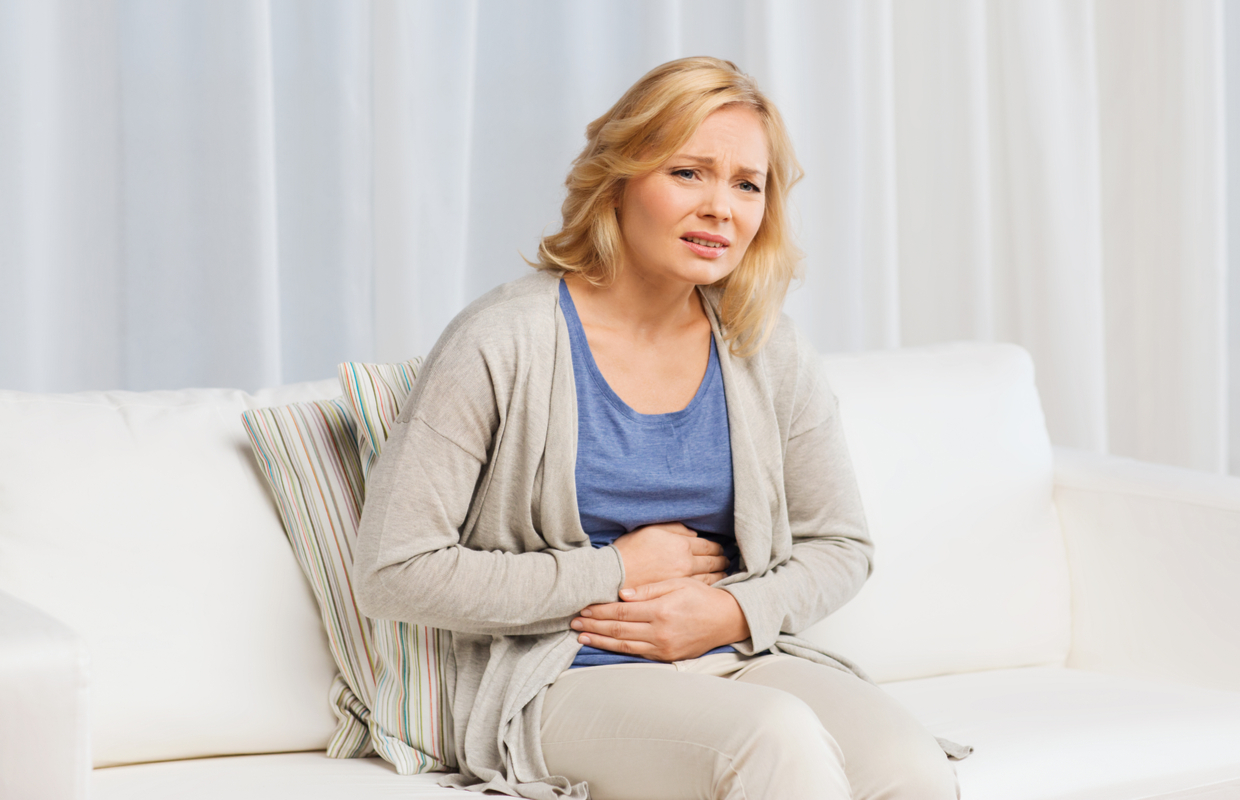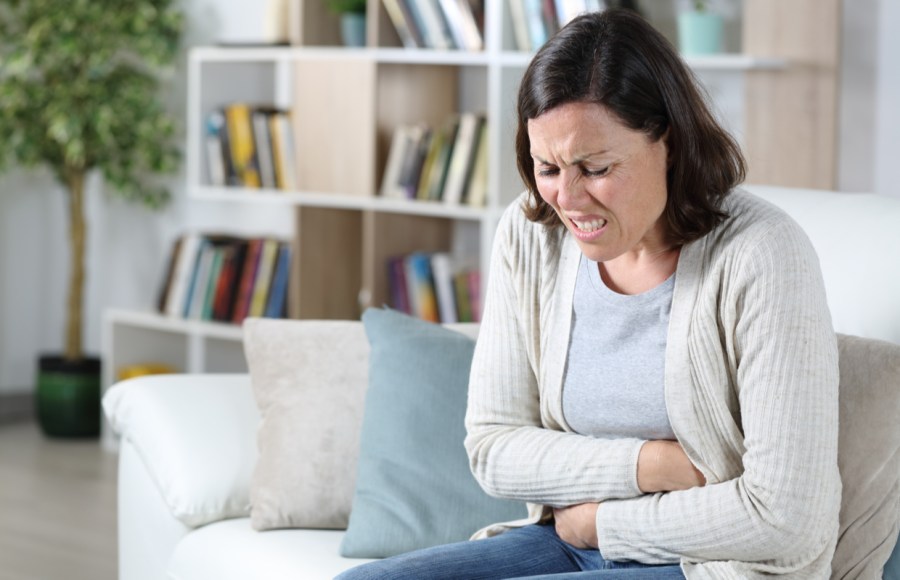From contraception queries to period ponderings, we recruited the experts to answer your menopause questions…
Q: ‘As I get older, my periods have started becoming heavier, lasting longer and becoming more frequent. Is this normal or should I go to my GP?’
Dr Anne Henderson, gynaecologist and author of Natural Menopause:
‘Changes in menstrual pattern are one of the most common features of the perimenopause, which can commence in the early 40s, but typically after 45 for most women.
‘More than 90 per cent of women will notice a change in their bleeding pattern. This can include periods that are closer together, further apart or a combination of the two. There may also be additional intermenstrual bleeding (usually spotting).
‘Menstrual blood loss can also become significantly heavier with episodes of clots and flooding, even in women who previously had normal bleeding. As the perimenopause continues, periods can then start to space further apart and become lighter, suggesting that the menopause is impending.
‘These are all very individual patterns and one of the key determinants is a woman’s own genetic history from her mother, grandmother and other female family members.
‘Usual health measures are key including adequate nutrition, regular exercise to maintain fitness and adequate sleep, as these all impact on the menstrual cycle. Eating foods high in iron, such as spinach or taking a daily kelp supplement, such as A.Vogel Kelp (£7.99, avogel.co.uk), may also be benefi cial for some women experiencing heavy periods.
‘In extremely rare circumstances, particularly when there is a sudden, sustained and signifi cant change to the menstrual bleeding pattern, there may be other underlying causes, which should be investigated and I recommend that you seek advice from your GP. For the vast majority of perimenopausal women, however, this will not be indicated.

Q: ‘I am almost 50 years old. Do I still need to use contraception?’
Dr Anne Henderson, gynaecologist and author of Natural Menopause:
‘The need for contraception will depend on whether a woman is still ovulating, and this can be difficult to assess as a ‘one-off’ review. Anyone who is still having periods, even if these are becoming increasingly intermittent, should be deemed fertile, albeit the likelihood of pregnancy is extremely low, and should take contraceptive precautions if they wish to guard against an unwanted pregnancy.
‘The usual diagnosis of postmenopause is made in a woman aged 50 and below who has not menstruated for two years, whereas over the age of 50, the duration is one year. If these criteria are followed, then the likelihood of an inadvertent, unplanned conception is negligible.
‘The FSH (follicle stimulating hormones) level can be used as a marker of fertility but as outlined above, the range is extremely wide and this can be misleading. I would always recommend that, for any woman concerned about the need for contraception during the perimenopause/menopause, they should discuss this with their GP/practice nurse or menopause specialist.’
Q: ‘My periods seem to have gotten heavier and more painful in my 40s. Should I be concerned?’
Dr Shree Datta, consultant obstetrician and gynaecologist for INTIMINA:
‘It’s very common to notice a change in your monthly cycle every so often, but if you’ve noticed a persistent change in the nature, duration or frequency of your periods, it’s definitely worth getting checked over by your doctor.
‘Your doctor will consider whether you are taking any hormonal contraception or other medication, which can influence your periods, as well as exploring any relevant medical problems. Once they’ve made an assessment, they may send you to a gynaecologist for blood tests to check for anaemia and to make sure your hormonal levels are normal.
‘In our gynaecology clinic, we would review these results, along with your smear test outcome, and also consider an ultrasound scan to identify changes, such as a polyp or fibroid in your womb. If any changes are found, we would discuss whether you need further investigations, such as a hysteroscopy or biopsy, medication or an operation to treat the problem.’

Q: ‘Since reaching menopause, I’ve felt a heaviness around my lower tummy that’s getting more uncomfortable as time goes on. Could it be a pelvic organ prolapse and, if so, is it treatable?’
Dr Shree Datta, consultant obstetrician and gynaecologist for INTIMINA:
‘It’s always good to get any changes to your body checked over by your doctor or gynaecologist early, so that if there is a problem, we can treat it when it’s small. Here, your doctor will ask you some questions about the heaviness you are feeling. For example, is it bloating or related to opening your bowels?
‘We’ll also ask about related symptoms, such as postmenopausal bleeding, urinary problems or abdominal pain, as well as reviewing your medical background. We will examine your tummy to check for any cysts or masses and examine your vagina to determine whether you have vaginal wall or uterine prolapse.
‘Pelvic organ prolapse is treatable, but it’s important that you are investigated by a specialist so that we can apply the best treatment suited to your needs and type of prolapse. The types of treatment we’ll consider depend on what’s causing your heaviness.
‘If it is pelvic organ prolapse, we’ll consider whether physiotherapy, weight loss, pessary treatment or surgery are the best options for you.’
Q: ‘I am 65 years old and no longer get invited for cervical screening. Why is this?’
Dr Anne Henderson, gynaecologist and author of Natural Menopause:
‘The current NHS cervical screening programme ends at age 65. Women are called every three years during their adult life until they turn 50, when the screening intervals increase to five years.
‘The screening interval and end date are based on a large body of scientific and epidemiological data indicating that the incidence of new cases of cervical pathology in women in their 50s and beyond is extremely low, and significantly less than pathology found in younger women.
‘The safety of the screening programme has been further enhanced by the introduction of primary HPV testing, which was introduced in England a couple of years ago and has now been rolled out across Scotland, Wales and Northern Ireland as well. This has essentially automated the screening programme and taken out a substantial proportion of issues due to human error.
‘For those who are up to date with cervical screening and have negative results, there should be no cause for concern. If you notice any of the following symptoms, it’s worth contacting your GP for advice: postcoital bleeding, particularly if this is bright red and persists for more than three months, any new blood-stained or offensive vaginal discharge and any persistent, fresh intermenstrual bleeding lasting longer than three months.’

Q: ‘How can I eat well to manage menopause symptoms as I’m unsure about taking HRT?’
Alison Cullen, nutritionist for A.Vogel:
‘It’s important to know that your digestive system may become a little more sensitive and/or sluggish during the menopausal transition. This is because your sex hormones have stimulating and soothing effects on your digestive tract. As levels fluctuate, your gut feels the impact. This is, therefore, a great time to take positive action to improve your diet and your digestive power!
‘A simple strategy to improve digestion is to ring fence your mealtimes. I know, mid-life women are the last people to have time to prioritise any kind of ‘me’ time, and usually eat while doing at least three other jobs at the same time. However, sitting down, taking a breath or two, and taking your time over chewing your food properly, really savouring it, will have a positive effect on your digestive system, meaning you’ll absorb more nutrients from your food.
‘Next, include good quality protein with each meal. This is increasingly important during the menopausal transition. Protein is far more valuable to you than refined carbs, which should be gently labelled “occasional use only”.
‘Fill your plate with veggies as a diet of fruit and veg is associated with reduced risk of menopausal symptoms. Eat veg of all colours but favour the green, leafy variety for the beneficial effect on your gut bacteria and your brain.
‘Lastly, boost the dietary space you give to phytoestrogens. These are plant oestrogens which guard oestrogen receptor sites against harsh, environmental oestrogens. They can also gently support your oestrogen levels during the menopausal transition. They have also been shown to reduce the frequency of hot flushes.
‘They’re found in wholegrains, fruit and veg, or you can choose a menopause supplement that contains them, such as A.Vogel Menopause Support (£7.75).’







